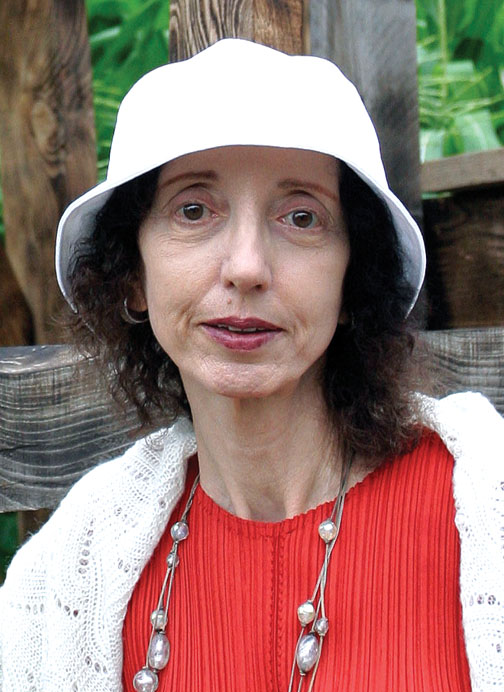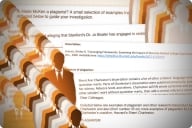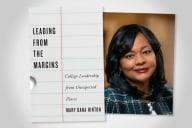You have /5 articles left.
Sign up for a free account or log in.
Joyce Carol Oates’s new novel, Mudwoman (HarperCollins), begins with a psychotic mother abandoning her two small girls to die -- one, she leaves to drown in the mud flats of a river; the other, she locks inside a discarded refrigerator. Later scenes include a college student’s gruesomely failed suicide attempt, a house full of orphans in foster care burning to the ground, and a man’s accidental death followed by his very deliberate -- and detailed -- dismemberment.
|
"Certainly she was serious: a serious woman. The first female president of the University. Not that femaleness was an issue, it was not. Without hesitation M.R. would claim, and in interviews would elaborate, that not once in her professional career, nor in her years as a student, had she been discriminated against, as a woman. It was the truth, as M.R. knew it. She was not one to lodge complaints or to speak in disdain, hurt, or reproach." --Mudwoman |
As a female academic and leader, M.R. faces a double and often opposing set of societal expectations. The definitions of success for a woman and for a scholar and university president seem to form a catch-22, a zero-sum game in which M.R.'s every career achievement represents a sacrifice of her personal life or her femininity -- yet her own ineradicable femaleness means that some at the university will never believe in her as a leader. Indeed, M.R. herself sometimes fears that her sex renders her categorically unfit.
Is it really so difficult to be a woman president these days? Not so much, some experts said. “The role you play takes precedence over your gender,” said Susan Resneck Pierce, a presidential consultant, occasional Inside Higher Ed contributor, and president emerita of the University of Puget Sound, where she was the first female president.
A: The memorable thing is that a woman, at last, was named president of this distinguished university-- of course there would be "gender bias" against her, as the firs
 t of her kind. Princeton has its first woman president -- the distinguished Shirley Tilghman -- naturally, there were old grads who objected when she was first named president. Very likely, the same old grads objected to our first Jewish president, who preceded her -- the quite brilliant Harold Shapiro. We are in a remarkable era in which there are numerous woman presidents of great universities -- Harvard, Penn, MIT. Women are still in the minority in universities -- only a few decades ago, there were virtually no women in the higher ranks at all. So there has been a remarkable change in the past decade. Who would have predicted this?
t of her kind. Princeton has its first woman president -- the distinguished Shirley Tilghman -- naturally, there were old grads who objected when she was first named president. Very likely, the same old grads objected to our first Jewish president, who preceded her -- the quite brilliant Harold Shapiro. We are in a remarkable era in which there are numerous woman presidents of great universities -- Harvard, Penn, MIT. Women are still in the minority in universities -- only a few decades ago, there were virtually no women in the higher ranks at all. So there has been a remarkable change in the past decade. Who would have predicted this?A: Absolutely! We all know people like this. But some of them are married, and even have children. There is an ecstatic obsessiveness in such work when it's for a "higher cause." I don't think that one can succeed on the highest professional levels without some sort of genuine obsessiveness.
Q: I listened to an interview in which you described M.R. as "some version of [your]self." In what ways, if any, are M.R.'s struggles -- internal and external -- representative of your own experiences over the years as a successful woman in academe?
A: I think that M.R. is both unique individual yet, in the academic world, a recognizable "type" -- the utterly devoted, dedicated, selfless individual, often a woman, who seems to have suppressed or rebuked a private, personal life. I wanted to present this individual as a complex, psychological person who has "forgotten" her own conflicted self. It's the psychology of Quakerism -- one is "good" -- on principle; but human beings cannot be always, entirely, homogeneously "good" -- it is just not possible. Up out of the unconscious come repressed, terrifying memories. Yet M.R. is always grateful to be alive: she is more conscious than most of us of how easily it might be that case, that one is not granted life.
Her debilitating bouts of insomnia parallel my own in 2008-2009. I am still vulnerable to insomniac nights, but nothing like those.
However, M.R. does have a "lover" -- though a "secret lover" -- and it would seem that, near the end of the novel, Anton may want to marry her, or live with her, now that his imperfect marriage seems to be ending. This forceful and gregarious character, a Harvard astronomer, is not so very different in his personality from my second husband Charlie Gross, a neuroscientist at Princeton; I have made him very imperfect, very flawed, but -- M.R. loves him.
Q: There is a great deal of friction for M.R. between her own values, on the one hand, and the conduct expected of a university president, on the other. To what extent do you see M.R.'s brasher actions and proposals as president -- turning down a very large proposed donation from an environmentally destructive natural gas company; a vast expansion of financial aid "with particular emphasis upon the children of lower-middle-income families," with an added dig at "legacy" admits -- as valid critiques of elite academe? To what extent do they instead simply represent her growing detachment from reality?
A: There are different categories of "university president." The more common is simply a skilled fund-raiser -- he or she is not primarily an idealist, and is in the service of the board of trustees. But there are university presidents who are idealists, and they may encounter very real conflicts with their (often conservative) trustees. M.R. behaves as a Quaker might -- following her intuition and instinct of what is morally right. She is not a skilled or practiced politician, but she knows enough to learn from the university attorney. However, when she becomes exhausted and has a breakdown, she loses her capacity to compromise; she comes close to utterly failing, for the first time in her professional career.
I wanted to write about the particular anguish and anxiety that people feel about their professional roles -- this is very real in our society, yet writers usually focus upon sexual, domestic matters, to what seems to me an altogether exaggerated degree. (I've loved the prose fiction of John Updike, for instance, but his reiterated subject is always -- only-- sexual relations of one kind or another among very limited individuals. Why is this important? I don't think it's at all an accurate mirroring of our complex lives.)
Q: Why did you decide to set the novel during the lead-up to the Iraq war? What does the war represent for M.R.?
A: This was a terrible, tragic error in our foreign policy -- academics could predict it, as everyone at Princeton did, most vociferously -- yet academics/ intellectuals just don't have the political power to prevent such catastrophes. M.R. "knows" that she is right -- (it's her Quaker intuition also) -- but she is powerless to effect any change. It's a tragic dilemma, not readily solved. For me, it is enough just to understand it, and to chart its effect upon individuals like M.R. The division in the U.S. between "conservatives" and "liberals" became a chasm at this time, and it is still enormous, with a hatred of President Obama that is particularly virulent, a thinly disguised racism. In his brilliant and prescient Education, in the early 20th century, Henry Adams foresaw the perils of a democracy when wealth is concentrated in the hands of a few, and those few wield tremendous political influence to protect their own positions.
Q: The university is in many ways deeply divided by political issues -- a division that comes to a head in the events involving Alexander Stirk, a politically conservative student who claims to have been physically attacked by classmates who oppose his views. Is this representative of the atmosphere on some campuses today?
A: Yes, this is an accurate portrait of divisions on college campuses today. Extreme right-wing Christians, some of them Evangelicals, and right-wing Roman Catholics, some of them members of Opus Dei, agitate against the prevailing "liberal" climate, often with dramatic results. Stirk is typical -- though I wanted to make him highly individual, as well; he reminds M.R. of the very young man who'd saved her life, in a long-ago time she has tried to forget. So she is conflicted about him and keeps (naively) wanting to be his "friend."
A: There was a president of a great university who did have a "breakdown," some years ago, took three months to recover, to rest and to read; and was rejuvenated, and returned to complete his term of office with great success. I took this individual as a model -- though this individual is nothing at all like M.R. Neukirchen. [Reporter's note: This is likely a reference to former Harvard University president Neil Rudenstine, who took a leave of absence during the winter of 1994-95 and returned to lead the university until 2001.]
In her encounter with the "mud-complected" young man near the end of the novel, M.R. confronts her old, primitive past, acts bravely, if desperately, and triumphs. She escapes, and "returns to the University by dusk."








